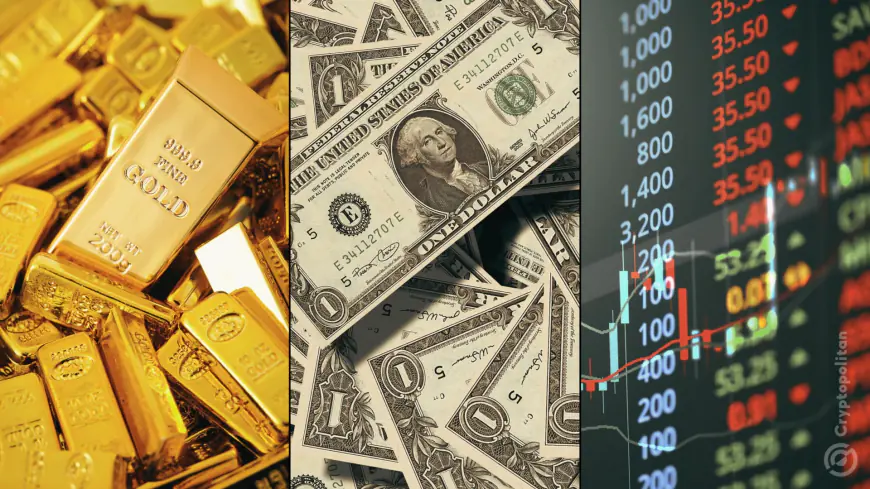Traders push dollar and gold higher as stocks stall ahead of U.S. election
Gold has reached record highs, sitting at $2,757.99 per ounce, even with the dollar surging. Investors are playing it safe, refusing to place big bets ahead of the U.S. presidential election, and it’s clear that political uncertainty is driving much of this action. The dollar continues to climb, hitting multi-month peaks against the yen, euro, […]

Gold has reached record highs, sitting at $2,757.99 per ounce, even with the dollar surging. Investors are playing it safe, refusing to place big bets ahead of the U.S. presidential election, and it’s clear that political uncertainty is driving much of this action.
The dollar continues to climb, hitting multi-month peaks against the yen, euro, and sterling. The Japanese yen, already the worst performer this year, is now trading at 152.45 per dollar.
Meanwhile, U.S. Treasury yields have also spiked to three-month highs, putting more weight on the yen and euro, while European stocks are showing weakness, with the STOXX 600 down 0.1%.
U.S. election triggers volatility
The election is rattling markets globally. Traders are preparing for wild swings in the days ahead, especially with the odds of Donald Trump beating Kamala Harris on the rise.
Opinion polls might still show a tight race, but the betting markets are slowly favoring Trump. That means tariffs and restrictions on immigration could be back in the spotlight, with inflation ticking up as a result.
The Federal Reserve’s role in all of this can’t be ignored. Just a month ago, traders were counting on the Fed to slash rates by a full percentage point by January.
Now those hopes have cooled, and traders are only expecting a half-point cut. That’s thanks to stronger-than-expected U.S. economic data showing growth and job creation. This change in expectations is why Treasury yields are soaring.
The yield on the benchmark U.S. 10-year note has climbed by 2.6 basis points to 4.2316%, with a 50-basis-point rise since the Fed’s rate cut on Sept. 18. In Europe, it’s a similar story. The euro slipped 0.1% to $1.0787, hitting its lowest point since August.
Goldman Sachs is warning that a Trump victory could knock the euro down by as much as 10% due to the threat of new tariffs. Japanese stocks aren’t faring much better, with the Nikkei down 0.8% as the yen continues its losing streak.
Gold defies dollar strength
While the dollar climbs, gold is pushing higher, which is unusual since these two usually move in opposite directions. Analysts are pointing to the conflict in the Middle East as a major factor driving this, with risk-averse investors piling into gold.
The metal’s record-breaking surge comes even as U.S. yields are rising. That’s got analysts wondering just how much further gold can go.
In the commodity markets, oil is dropping too. Brent crude futures slipped 0.7% to $75.44 a barrel, and West Texas Intermediate fell 0.9%. Rising fuel inventories in the U.S. are putting downward pressure on prices, while investors are watching the diplomatic efforts in the Middle East closely.
Bitcoin meets resistance
Bitcoin has also hit a wall, failing to break above the $70,000 mark yet again. The rising Treasury yields are causing some concern in the crypto markets, with traders worried that the higher yields could weigh on riskier assets like Bitcoin.
Despite this, some analysts believe that the path for Bitcoin is still on the upside, citing the anticipated “golden cross” pattern. As bond yields rise, riskier assets like Bitcoin and tech stocks could face more headwinds.
Others see the Fed’s rate cut as a mistake, drawing comparisons to the 1967 rate cut that led to inflation and, ultimately, a recession.
Back then, the central bank cut rates in the face of a tight labor market, and the result was broad-based inflation that spiraled into a recession a few years later. There’s concern that history could repeat itself, especially with inflation pressures already building.
At press time, Bitcoin was worth $66,508.
What's Your Reaction?









































































































